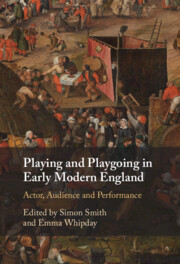Book contents
- Playing and Playgoing in Early Modern England
- Playing and Playgoing in Early Modern England
- Copyright page
- Contents
- Illustrations
- Notes on Contributors
- Acknowledgements
- A Note on the Text
- Introduction
- Part I Players
- Part II Playgoers
- Part III Playhouses
- Chapter 9 ‘Theatre’ and ‘Play+House’: Naming Spaces in the Time of Shakespeare
- Chapter 10 ‘[T]hough Ram Alley Stinks with Cooks and Ale / Yet Say There’s Many a Worthy Lawyer’s Chamber / Butts upon Ram Alley’: An Innsman Goes to the Playhouse
- Chapter 11 Playing with the Audience in Othello
- Chapter 12 ‘All Their Minds Transfigured So Together’: The Imagination at the Elizabethan Playhouse
- Bibliography
- Index
Chapter 10 - ‘[T]hough Ram Alley Stinks with Cooks and Ale / Yet Say There’s Many a Worthy Lawyer’s Chamber / Butts upon Ram Alley’: An Innsman Goes to the Playhouse
from Part III - Playhouses
Published online by Cambridge University Press: 10 March 2022
- Playing and Playgoing in Early Modern England
- Playing and Playgoing in Early Modern England
- Copyright page
- Contents
- Illustrations
- Notes on Contributors
- Acknowledgements
- A Note on the Text
- Introduction
- Part I Players
- Part II Playgoers
- Part III Playhouses
- Chapter 9 ‘Theatre’ and ‘Play+House’: Naming Spaces in the Time of Shakespeare
- Chapter 10 ‘[T]hough Ram Alley Stinks with Cooks and Ale / Yet Say There’s Many a Worthy Lawyer’s Chamber / Butts upon Ram Alley’: An Innsman Goes to the Playhouse
- Chapter 11 Playing with the Audience in Othello
- Chapter 12 ‘All Their Minds Transfigured So Together’: The Imagination at the Elizabethan Playhouse
- Bibliography
- Index
Summary
Lording Barry’s play, Ram Alley, is a sensory mêlée, written for performance in 1608 and staged by the Children of the King’s Revels company at the Whitefriars playhouse. This chapter explores the world of ‘Ram Alley’, both the area staged in the play, and the real alleyway of that name, a short distance from the playhouse. Using recent scholarly work on the early modern senses, it connects the physical and imagined worlds through an exploration of the perception of a significant segment of the contemporary audience – the men of the Inns of Court whose rooms abutted on the real Ram Alley. Barry shifts our understanding of sensory hierarchy from the supremacy of the visual – an ocular centricity which has classical antecedents and becomes the dominant ideology emerging from the Renaissance - to the olfactory. This chapter demonstrates how the play’s challenge to dominant sensory theory reflects Ram Alley’s wider transgressive intersensoriality.
- Type
- Chapter
- Information
- Playing and Playgoing in Early Modern EnglandActor, Audience and Performance, pp. 205 - 222Publisher: Cambridge University PressPrint publication year: 2022



